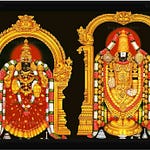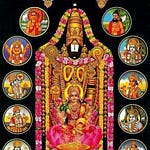Verse 25 of the Śrī Veṅkaṭeśa Suprabhāta is one of my favorite verses, as it describes the ongoing preparations for the Lord’s sacred bath, or tiru-mañjanam, in the morning. This theme is particularly appropriate for today (the day I’m writing this post) is Śrī Nṛsiṃha Jayantī, celebrated with special tiru-mañjanams for Lord Lakṣmī-Nṛsiṃha.
elā-lavaṅga-ghanasāra-sugandhi-tīrthaṃ divyaṃ viyat-sariti hema-ghaṭeṣu pūrṇam | dhṛtvā adya Vaidika-śikhā-maṇayaḥ prahṛṣṭās tiṣṭhanti Veṅkaṭa-pate! tava suprabhātam || (VSu 25) एला-लवंग-घन-सार-सुगन्धि-तीर्थं दिव्यं वियत्-सरिति हेम-घटेषु पूर्णम् । धृत्वा ऽऽद्य-वैदिक-शिखामणयः प्रहृष्टास् तिष्ठन्ति वेङ्कट-पते! तव सुप्रभातम् ॥ 25 ॥
Golden pots filled to the brim with sacred water from the Ākāśa Gaṅgā perfumed with cardamoms cloves camphor are borne by the foremost vaidika priests who stand utterly delighted before You: O Lord of Veṅkaṭam, a blessed morning unto You!
The daily bath of Lord Veṅkaṭeśvara
The sacred water for Lord Śrīnivāsa’s tirumanjanam is brought every morning from the Ākāśa Gaṅgā waterfall, described here by the phrase viyat-sarit. We have already seen a reference to the waterfall in verse 5, describing the arrival of the Saptarṣi (the Seven Celestial Sages) to worship Lord Veṅkaṭeśa before dawn. In that verse, the expression was ambiguous and could refer to either the terrestrial Ākāśa Gaṅgā waterfall or to the Milky Way, flowing like a celestial river across the sky.
Here, though, the reference must be to the physical Ākāśa Gaṅgā, since it is already well past dawn and the Milky Way will no longer be visible in the sky. But even though the water is from a terrestrial source, it is still divyam tīrtham (sacred water), because it is specifically from the Ākāśa Gaṅgā. As Swāmī Deśikar says in the opening verse of the Dayā-śataka, the mountains of Tirupati are the crystallized rock candy of Lord Śrīnivāsa’s Compassion personified,1 and so the water that flows from a mountain spring here is a further subsequent liquefaction of Her grace. It is thus entirely well-suited for bathing Lord Śrīnivāsa.
Note further that the water used to bathe Lord Śrīnivāsa is perfumed with a variety of fragrant spices—cardamom, cloves, and camphor are specifically mentioned. There are in fact specific ingredients specified for perfuming the different waters used in the worship of the Lord, imparting to each of them a distinct flavor. Cardamom and camphor are common ingredients in all of these, thus giving rise to the special taste that is characteristic of the sacred water served as tīrtham in temples to Lord Śrīnivāsa.
Who brings this sacred water?
Also worth noting are the specific people who bring the sacred water for the Lord’s tirumañjanam. They are described by the lovely phrase vaidika-śikhāmaṇi (in the plural) which is worth pondering over: The word śikhāmaṇi, often translated as “crest-jewel” in English renditions of Sanskrit texts, plays a role analogous to the term “crown jewel” in idiomatic English. It refers to the very best of the best, the crème de la crème, of whatever we are speaking about. In this case, that would refer to vaidikas: highly orthoprax Brahmins who live their lives strictly according to Vedic injunction, dedicated entirely to spiritual pursuits. Thus, the vaidika-śikhāmaṇis referred to here are the very best of those who follow this very difficult path, for they have dedicated their lives utterly to the worship of Lord Śrīnivāsa. (And it’s worth bearing in mind that it wasn’t until the 20th century that Tirupati was made easily accessible via motorable roads and so on; the temple was an isolated patch of civilization in a thickly forested wilderness for most of its existence.) But even more importantly, they take delight in this service: They are described as prahṛṣṭa, “utterly delighted”.
Specifically, in the context of this verse, this term refers to the descendants of the famous Śrīvaiṣṇava, Pĕriya Tirumalai Nambi, who was the first to bring water (upon Lord Śrīnivāsa’s own request) for the Lord’s tirumañjanam from Ākāśa Gaṅgā. For nearly a millennium now, his descendants have continued to devoutly serve Lord Veṅkaṭeśvara by bringing water every morning from Ākāśa Gaṅgā, in addition to leading several congregational Vedic recitations and performing many other acts of service. They thus continue to live up to the phrase vaidika-śikhāmaṇi.
Since the day I am writing this (Vaikāsi Svāti) also happens to be the tiru-nakṣatram of Pĕriya Tirumalai Nambi, I have added a short appendix to this post with some more details about him.
Echoes from the Tamil: The Nīr-āṭṭam
This verse reminds me of the supremely beautiful Nīr-āṭṭam song from Pĕriyāḻvār’s Pĕriyāḻvār Tirumoḻi (PĀTM II.4), in which he takes on Yaśodā’s role, calling the young Kṛṣṇa to come and take His daily bath. It is customary to recite either the Puruṣa-sūkta or the Nīr-āṭṭam when performing the tirumañjanam ritual bath for the deity, whether at home or in the temple.
In two successive verses in the song, Pĕriyāḻvār, speaking in the voice of Yaśodā, describes the various preparations (s)he has made for Kṛṣṇa’s bath:
kāyccina nīrŏḍu nĕlli kaḍārattil pūrittu vaittēn (PĀTM II.4.3c) காய்ச்சின நீரொடு நெல்லி கடாரத்தில் பூரித்து வைத்தேன்
I have filled up the water-pot with boiled water and gooseberry (nĕlli / āmlā)
And similarly:
mañjaḷum sĕṅ-kaḻu-nīrin vāśigaiyum nāṟu sāndum añjanamum kŏṇḍu vaittēn (PĀTM II.4.4cd) மஞ்சளும் செங்கழுநீரின் வாசிகையும் நாறு சாந்தும் அஞ்சனமும் கொண்டு வைத்தேன்
I have kept turmeric and a red-lily garland and fragrant sandalwood paste and collyrium (mai) for you.
Though the specific ingredients are different from the ones mentioned in the Suprabhātam, the spirit of serving the Divine with the very best that nature has to offer and of taking delight in such service is strongly present in both texts.
Appendix: Pĕriya Tirumalai Nambi
Pĕriya Tirumalai Nambi’s tiru-nakṣatra is today, Vaikāsi Svāti. Hence it is especially apposite to speak of him and his yeoman contribution to Lord Veṅkaṭeśvara and to the early Śrīvaiṣṇava community.2
Also known as Śrī-Śaila-Pūrṇa (a literal translation of “Tirumalai Nambi”), he was the maternal uncle of Bhagavad Rāmānujar and the father of, among others, Tiruk-kurugai-pirān Piḷḷān (author of the Tiru-vĀṟāyirap-paḍi, the first commentary on the Tiru-vāy-mŏḻi of Nammāḻvār). A disciple of Swāmī Āḷavandār, Pĕriya Tirumalai Nambi moved from Śrīraṅgam to Tiruvēṅkaṭam when he heard the lament of his ācāryan that Lord Veṅkaṭeśvara was being neglected due to the difficulty of reaching Him and conducting all the daily rituals at such a remote spot. Pĕriya Tirumalai Nambi then performed daily service to Lord Veṅkaṭeśvara by carrying the sacred water from Ākāśa Gaṅgā for the Lord’s tirumañjanam (a task that, remember, would have to be performed in the pre-dawn darkness on steep mountain paths). It is said that the Lord Himself showed him the location of the Ākāśa Gaṅgā spring, and called him tāta (“father” in Sanskrit).
Pĕriya Tirumalai Nambi was renowned as an expert on the Rāmāyaṇa of Vālmīki. For a full year he taught Bhagavad Rāmānujar the esoteric secrets of the Rāmāyaṇa at the foothills of Tirupati, thus going up and down the mountain multiple times a day between his service to the Lord and his teaching obligation. Even today, Śrīvaiṣṇavas recite a taniyan in praise of this great soul before commencing the recitation or study of the Rāmāyaṇa:
Pitāmahasyâ api pitāmahāya Prācetasâ-ādeśa-phala-pradāya | Śrī-Bhāṣya-kārô-uttama-deśikāya Śrī-Śailapūrṇāya namo namastāt ||
To the one who is the grandfather of Brahmā who is Grandfather to the cosmos, the bestower of the fruits of Vālmīki, descendant of Pracetas, the best teacher of Bhagavad Rāmānujar composer of the Śrī-Bhāṣya: To the blessed Śrī-Śaila-pūrṇa a.k.a. Tirumalai Nambi, salutations, salutations galore!
The first of these salutations plays on the fact that Brahmā is frequently known as Pitāmaha, the Grandfather of the world. Brahmā’s father, in turn, is the Supreme Lord Himself. And since the Lord Himself called Pĕriya Tirumalai Nambi tāta (“father”), that makes him the grandfather of the Grandfather!
One last thing to note: Pĕriya Tirumalai Nambi composed the Tamil taniyan to Tirup-pāṇ Āḻvār, recited before any recitation of the Amalan-ādipirān. Since this short but incredibly beautiful set of 10 pāśurams is supposed to be recited every day by Śrīvaiṣṇavas, it effectively means that we have the privilege of thinking of Pĕriya Tirumalai Nambi’s service every single day.
The history of the Śrīvaiṣṇava tradition, and indeed its continued survival to this day, is entirely due to great souls like Pĕriya Tirumalai Nambi who expressed their devotion to Śrīman-Nārāyaṇa through a combination of devotional service (kaiṅkarya) to the temple deities, deep personal study (svâdhyāya) of the sacred texts of the tradition in both Sanskrit and in Tamil, and selfless teaching (pravacana) of the texts to succeeding generations.
|| Śrī-Padmāvatī-nāyikā-sameta-Śrī-Śrīnivāsa-parabrahmaṇe namaḥ ||
We have already seen this verse from the Dayā-śataka in detail in the context of verse 15 of the Suprabhātam.
Among other sources online, here is one that offers a brief summary (in Tamil) of Pĕriya Tirumalai Nambi’s life and contributions. Another source, this time entirely in English, is available here. It contains many more details about the story of the discovery of the Ākāśa Gaṅgā spring.









Share this post